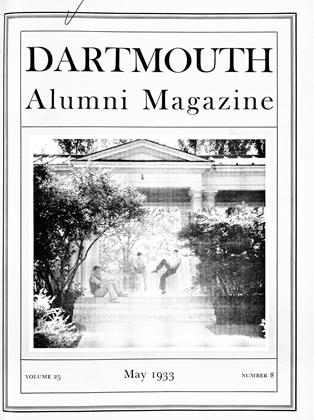Speaking on "Unity as an Educational Ideal" at the exercises on April 10 marking the twenty-fifth anniversary of the founding of the Harvard Graduate School of Business Administration, President Hopkins denounced narrow specialization in higher education as a contributing factor to the lack of cooperation among men and nations today. "In our colleges and universities," he declared, "narrow specialization has wrought grave injury. Here, as in our national life, the displacing of wide interests and varied contacts by specialized interest and specialized effort has contributed to the cumulative breaking down of the will and the ability for cooperative action among men
"I have no belief personally in educational programs which deal exclusively with profundities of specialized knowledge to the elimination of consciousness of the areas of knowledge. I have before stated my belief that the world today is suffering from uncoordinated thought."
Mr. Hopkins praised the Harvard Business School's recognition of the fact that "specialized education becomes most advantageous to the individual and most profitable to the society it serves when it demands acquaintanceship with knowledge in general before it begins to particularize."
In expressing himself upon the functions of higher education today, President Hopkins asserted that "education must strive to extend its functions beyond any mere acquisition of knowledge, if it is to make any contribution to life in our rapidly developing world, rather than simply to be an observer of it. Traditionalism of method must give place to flexibility; specifications of what constitutes real culture must be reexamined and redefined; the qualifications of great teachers must include ability for developing character and personality among their students as well as inspiring them to seek knowledge; and the universities and colleges must avoid the appearance, as they must avoid the fact, of implications of their curricula that departmentalized knowledge is anything more than a device by which the student may be led to perception and understanding of the whole."
Accepting as true the dictum that the actions of man are largely guided by feeling, the President declared that formal education must assume obligations formerly assigned to other social institutions which have molded the feelings of men. "Weakening ties in the home, diminishing authority of the church, confusion of moral standards in the community all call for new appraisal of the obligations of higher education."
In discussing the undergraduate of today, Mr. Hopkins said that "motion has largely displaced form as an objective of life. Youth's antipathy to repose and contemplation, expressed in the vernacular phrase of 'going places and doing things,' is but a reflection of the spirit of the age, which has affected all the arts of our time as definitely as it has created the problem of the week-end exodus from our colleges." He also disagreed with "the inclination of the undergraduate world of the present time to hold pure rationalism as indicative of maximum intelligence" and pointed out that one can never be certain of the completeness of the data upon which rationalism is based.
President Hopkins indirectly praised Harvard's new Society of Fellows when he said, "Granted the all-pervasive importance of cultivating intellectual refinement and of developing intellectual power, means must be found for making these available primarily to those possessed of potential strength of character; of latent, if not active, attributes which make for personality; and of group consciousness which will subordinate individual acquisitiveness to public welfare."
In his closing analysis, the President stated that in the organization of world affairs "the disposition to cultivate good manners and to accept petty sacrifices therefor might induce in mankind a forbearance which would make human brotherhood an ideal of the spirit inviting cooperation rather than a militant propaganda arousing controversy."
Chauncey W. Baxter '10 Of Tacoma, who succeeds Bishop Sumner '98 in June as Alumni Councilor from the Far West.
 View Full Issue
View Full Issue
More From This Issue
-
 Article
ArticleHANOVER BROWSING
May 1933 By Rees Higgs Bowen -
 Class Notes
Class NotesClass of 1910
May 1933 By Harold P. Hinman -
 Class Notes
Class NotesClass of 1929
May 1933 By Frederick William Andres -
 Class Notes
Class NotesClass of 1902
May 1933 By Hermon W. Farwell -
 Article
ArticleDARTMOUTH'S WATCH ON THE RHINE
May 1933 By Gail M. Raphael '34 -
 Class Notes
Class NotesClass of 1932
May 1933 By Charles H. Owsley







